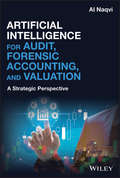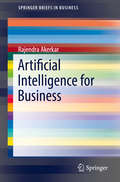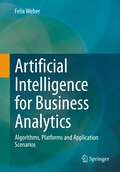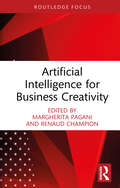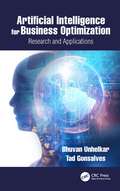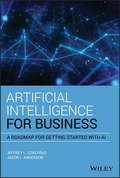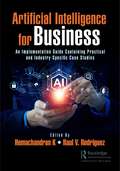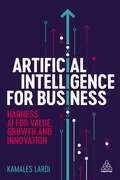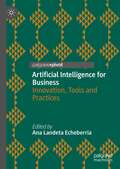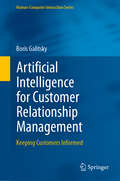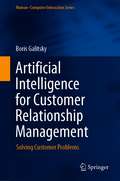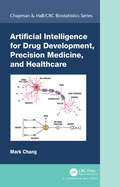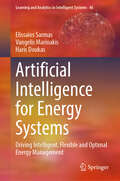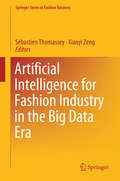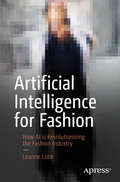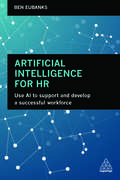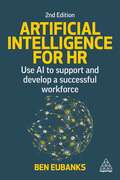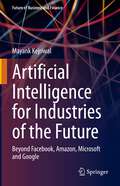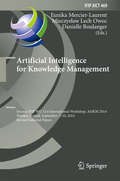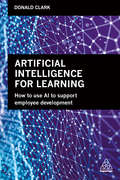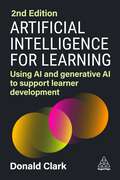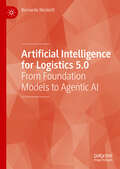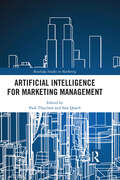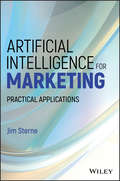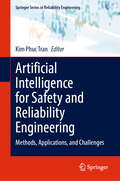- Table View
- List View
Artificial Intelligence for Audit, Forensic Accounting, and Valuation: A Strategic Perspective
by Al NaqviStrategically integrate AI into your organization to compete in the tech era The rise of artificial intelligence is nothing short of a technological revolution. AI is poised to completely transform accounting and auditing professions, yet its current application within these areas is limited and fragmented. Existing AI implementations tend to solve very narrow business issues, rather than serving as a powerful tech framework for next-generation accounting. Artificial Intelligence for Audit, Forensic Accounting, and Valuation provides a strategic viewpoint on how AI can be comprehensively integrated within audit management, leading to better automated models, forensic accounting, and beyond. No other book on the market takes such a wide-ranging approach to using AI in audit and accounting. With this guide, you’ll be able to build an innovative, automated accounting strategy, using artificial intelligence as the cornerstone and foundation. This is a must, because AI is quickly growing to be the single competitive factor for audit and accounting firms. With better AI comes better results. If you aren’t integrating AI and automation in the strategic DNA of your business, you’re at risk of being left behind. See how artificial intelligence can form the cornerstone of integrated, automated audit and accounting services Learn how to build AI into your organization to remain competitive in the era of automation Go beyond siloed AI implementations to modernize and deliver results across the organization Understand and overcome the governance and leadership challenges inherent in AI strategy Accounting and auditing firms need a comprehensive framework for intelligent, automation-centric modernization. Artificial Intelligence for Audit, Forensic Accounting, and Valuation delivers just that—a plan to evolve legacy firms by building firmwide AI capabilities.
Artificial Intelligence for Business (SpringerBriefs in Business)
by Rajendra AkerkarThis book offers a practical guide to artificial intelligence (AI) techniques that are used in business. The book does not focus on AI models and algorithms, but instead provides an overview of the most popular and frequently used models in business. This allows the book to easily explain AI paradigms and concepts for business students and executives. Artificial Intelligence for Business is divided into six chapters. Chapter 1 begins with a brief introduction to AI and describes its relationship with machine learning, data science and big data analytics. Chapter 2 presents core machine learning workflow and the most effective machine learning techniques. Chapter 3 deals with deep learning, a popular technique for developing AI applications. Chapter 4 introduces recommendation engines for business and covers how to use them to be more competitive. Chapter 5 features natural language processing (NLP) for sentiment analysis focused on emotions. With the help of sentiment analysis, businesses can understand their customers better to improve their experience, which will help the businesses change their market position. Chapter 6 states potential business prospects of AI and the benefits that companies can realize by implementing AI in their processes.
Artificial Intelligence for Business Analytics: Algorithms, Platforms and Application Scenarios
by Felix WeberWhile methods of artificial intelligence (AI) were until a few years ago exclusively a topic of scientific discussions, today they are increasingly finding their way into products of everyday life. At the same time, the amount of data produced and available is growing due to increasing digitalization, the integration of digital measurement and control systems, and automatic exchange between devices (Internet of Things). In the future, the use of business intelligence (BI) and a look into the past will no longer be sufficient for most companies.Instead, business analytics, i.e., predictive and predictive analyses and automated decisions, will be needed to stay competitive in the future. The use of growing amounts of data is a significant challenge and one of the most important areas of data analysis is represented by artificial intelligence methods.This book provides a concise introduction to the essential aspects of using artificial intelligence methods for business analytics, presents machine learning and the most important algorithms in a comprehensible form using the business analytics technology framework, and shows application scenarios from various industries. In addition, it provides the Business Analytics Model for Artificial Intelligence, a reference procedure model for structuring BA and AI projects in the company.This book is a translation of the original German 1st edition Künstliche Intelligenz für Business Analytics by Felix Weber, published by Springer Fachmedien Wiesbaden GmbH, part of Springer Nature in 2020. The translation was done with the help of artificial intelligence (machine translation by the service DeepL.com). A subsequent human revision was done primarily in terms of content, so that the book will read stylistically differently from a conventional translation. Springer Nature works continuously to further the development of tools for the production of books and on the related technologies to support the authors.
Artificial Intelligence for Business Creativity (Routledge Focus on Business and Management)
by Margherita Pagani Renaud ChampionArtificial Intelligence for Business Creativity provides an in-depth examination of the integration of Artificial Intelligence (AI) into the business sector to foster creativity. The book explores the interplay between micro-level individual creativity and macro-level organizational innovation through the lens of AI. It delves into three crucial areas where AI can stimulate business creativity: product and service design, optimized processes, and enhanced organizational collaboration. The authors also highlight the versatility and capability of generative AI systems in promoting creativity and innovation. Intended for business leaders, managers, entrepreneurs, and those interested in AI and creativity, the book offers practical guidance and insightful recommendations on how organizations can effectively utilize AI to enhance their creative process. By offering a comprehensive understanding of the role of AI in fostering creativity, the book equips its readers with the tools to stay ahead in the rapidly changing landscape of AI and creativity. This book is a valuable resource for anyone seeking to understand the impact of AI on business creativity and how to effectively leverage it to foster creativity and innovation in their organization. It is a must-read for anyone looking to increase their knowledge and understanding of AI and its impact on business creativity.
Artificial Intelligence for Business Optimization: Research and Applications
by Bhuvan Unhelkar Tad GonsalvesThis is primarily a business book that discusses the research and associated practical application of artificial intelligence (AI) and machine learning (ML) in order to achieve business optimization (BO). AI comprises a wide range of technologies, databases, algorithms, and devices. This book aims for a holistic approach to AI by focusing on developing business strategies that will not only automate but also optimize business functions, processes, and people’s behaviors. Artificial Intelligence for Business Optimization: Research and Applications explores AI and ML from a business viewpoint with the key purpose of enhancing customer value. It applies research methods and fundamentals from a practitioner’s viewpoint and incorporates discussions around risks and changes associated with the utilization of AI in business. Furthermore, governance risks, privacy, and security are also addressed in this book to ensure compliance with AI/ML applications. Readers should find direct and practical applications of the discussions in this book quite useful in their work environment. Researchers will find many ideas to further explore the applications of AI to business.
Artificial Intelligence for Business: A Roadmap for Getting Started with AI
by Jason L. Anderson Jeffrey L. CoveyducArtificial Intelligence for Business: A Roadmap for Getting Started with AI will provide the reader with an easy to understand roadmap for how to take an organization through the adoption of AI technology. It will first help with the identification of which business problems and opportunities are right for AI and how to prioritize them to maximize the likelihood of success. Specific methodologies are introduced to help with finding critical training data within an organization and how to fill data gaps if they exist. With data in hand, a scoped prototype can be built to limit risk and provide tangible value to the organization as a whole to justify further investment. Finally, a production level AI system can be developed with best practices to ensure quality with not only the application code, but also the AI models. Finally, with this particular AI adoption journey at an end, the authors will show that there is additional value to be gained by iterating on this AI adoption lifecycle and improving other parts of the organization.
Artificial Intelligence for Business: An Implementation Guide Containing Practical and Industry-Specific Case Studies
by Raul V. Rodriguez K HemachandranArtificial intelligence (AI) is transforming the business world at an unprecedented pace. From automating mundane tasks to predicting consumer behaviour, AI is changing the way businesses operate across all sectors. This book is an exploration of AI in business applications, highlighting the diverse range of ways in which AI is being used across different industries. The book begins with an overview of AI in business and its impact on the workforce. It then explores the role of AI in marketing, advertising, and tourism. The use of AI in personalized recommendations and chatbots is discussed in detail. The book then moves on to examine how AI is changing the retail industry, improving supply chain management, and enhancing the customer experience. The media and entertainment industry is also examined, with a focus on how AI is being used to personalize content and improve the user experience. The book also explores the use of AI in human resources, insurance, legal, and finance. The impact of AI on talent identification, recruitment, underwriting, document analysis, and financial forecasting is discussed in detail. In the healthcare and sports industries, AI is transforming the way we approach diagnosis, treatment, and training. The book examines how AI is being used to analyse medical images, develop personalized treatment plans, and improve patient outcomes. The use of AI in sports performance analysis is also discussed in detail. Finally, the book explores the use of AI in agriculture, energy, education, and the public sector. The potential of AI to optimize crop yields, reduce energy consumption, and improve the quality of education is discussed in detail. The book also examines how AI is being used to improve public services, such as transportation and emergency services. This book is a valuable resource for academics, researchers, professionals, and policymakers who are interested in understanding the potential of AI in the business world. The contributions from leading experts and researchers provide a comprehensive overview of AI in business applications, and how it is transforming different sectors. The book also examines the ethical dilemmas that arise from the use of AI in business, such as the impact on privacy and data security, and the potential for bias in AI algorithms. It provides valuable insights into how businesses can ensure that the use of AI is ethical and responsible. In conclusion, this book is a must-read for anyone interested in the potential of AI in the business world. It provides a comprehensive overview of AI in business applications and how it is transforming different sectors. The book examines the ethical dilemmas that arise from the use of AI in business, providing valuable insights into how businesses can ensure that the use of AI is ethical and responsible. We hope that readers will find this book informative and thought-provoking.
Artificial Intelligence for Business: Harness AI for Value, Growth and Innovation
by Kamales LardiUnderstand and harness the power of artificial intelligence to drive growth and innovation with this comprehensive guide. As AI continues to evolve, it is increasingly important for businesses to make informed decisions about how to use AI to drive success and growth. Artificial Intelligence for Business aims to provide a comprehensive understanding of AI and its applications in business, making it the ideal resource for business managers and leaders looking to stay ahead of the curve. With a focus on practical applications, it helps readers understand what AI is, how it is transforming business, how it can be used to innovate and how to navigate the realities of implementation. This book looks at the combination of AI with other emerging technologies such as blockchain, internet of things and virtual and augmented reality, showing how these can work together to create new business opportunities and solve complex business problems. It provides guidance on the importance of designing AI applications that are human-centred, including inclusive design and empathy in AI. It also features contributions and insights from leading experts and a wealth of real-world examples profiling AI adoption and innovation.
Artificial Intelligence for Business: Innovation, Tools and Practices
by Ana Landeta EcheberriaThis book seeks to build a shared understanding of Artificial Intelligence (AI) within the global business scenario today and in the near future. Drawing on academic theory and real-world case studies, it examines AI’s development and application across a number of business contexts.Taking current scholarship forward in its engagement with AI theory and practice for enterprises and applied research and innovation, it outlines international practices for the promotion of reliable AI systems, trends, research and development, fostering a digital ecosystem for AI and preparing companies for job transformation and building skills.This book will be of great interest to academics studying Digital Business, Digital Strategy, Innovation Management, and Information Technology.
Artificial Intelligence for Customer Relationship Management: Keeping Customers Informed (Human–Computer Interaction Series)
by Boris GalitskyThis research monograph brings AI to the field of Customer Relationship Management (CRM) to make a customer experience with a product or service smart and enjoyable. AI is here to help customers to get a refund for a canceled flight, unfreeze a banking account or get a health test result. Today, CRM has evolved from storing and analyzing customers’ data to predicting and understanding their behavior by putting a CRM system in a customers’ shoes. Hence advanced reasoning with learning from small data, about customers’ attitudes, introspection, reading between the lines of customer communication and explainability need to come into play.Artificial Intelligence for Customer Relationship Management leverages a number of Natural Language Processing (NLP), Machine Learning (ML), simulation and reasoning techniques to enable CRM with intelligence. An effective and robust CRM needs to be able to chat with customers, providing desired information, completing their transactions and resolving their problems. It introduces a systematic means of ascertaining a customers’ frame of mind, their intents and attitudes to determine when to provide a thorough answer, a recommendation, an explanation, a proper argument, timely advice and promotion or compensation. The author employs a spectrum of ML methods, from deterministic to statistical to deep, to predict customer behavior and anticipate possible complaints, assuring customer retention efficiently. Providing a forum for the exchange of ideas in AI, this book provides a concise yet comprehensive coverage of methodologies, tools, issues, applications, and future trends for professionals, managers, and researchers in the CRM field together with AI and IT professionals.
Artificial Intelligence for Customer Relationship Management: Solving Customer Problems (Human–Computer Interaction Series)
by Boris GalitskyThe second volume of this research monograph describes a number of applications of Artificial Intelligence in the field of Customer Relationship Management with the focus of solving customer problems. We design a system that tries to understand the customer complaint, his mood, and what can be done to resolve an issue with the product or service. To solve a customer problem efficiently, we maintain a dialogue with the customer so that the problem can be clarified and multiple ways to fix it can be sought. We introduce dialogue management based on discourse analysis: a systematic linguistic way to handle the thought process of the author of the content to be delivered. We analyze user sentiments and personal traits to tailor dialogue management to individual customers. We also design a number of dialogue scenarios for CRM with replies following certain patterns and propose virtual and social dialogues for various modalities of communication with a customer. After we learn to detect fake content, deception and hypocrisy, we examine the domain of customer complaints. We simulate mental states, attitudes and emotions of a complainant and try to predict his behavior. Having suggested graph-based formal representations of complaint scenarios, we machine-learn them to identify the best action the customer support organization can chose to retain the complainant as a customer.
Artificial Intelligence for Drug Development, Precision Medicine, and Healthcare (Chapman & Hall/CRC Biostatistics Series)
by Mark ChangArtificial Intelligence for Drug Development, Precision Medicine, and Healthcare covers exciting developments at the intersection of computer science and statistics. While much of machine-learning is statistics-based, achievements in deep learning for image and language processing rely on computer science&’s use of big data. Aimed at those with a statistical background who want to use their strengths in pursuing AI research, the book: · Covers broad AI topics in drug development, precision medicine, and healthcare. · Elaborates on supervised, unsupervised, reinforcement, and evolutionary learning methods. · Introduces the similarity principle and related AI methods for both big and small data problems. · Offers a balance of statistical and algorithm-based approaches to AI. · Provides examples and real-world applications with hands-on R code. · Suggests the path forward for AI in medicine and artificial general intelligence. As well as covering the history of AI and the innovative ideas, methodologies and software implementation of the field, the book offers a comprehensive review of AI applications in medical sciences. In addition, readers will benefit from hands on exercises, with included R code.
Artificial Intelligence for Energy Systems: Driving Intelligent, Flexible and Optimal Energy Management (Learning and Analytics in Intelligent Systems #46)
by Haris Doukas Elissaios Sarmas Vangelis MarinakisThis book focuses on creating an integrated library of learning models and optimization techniques to assist decision-making on issues in the energy and building sector. It provides modern solutions to energy management and efficiency while addressing a scientific gap in the development of advanced algorithmic methods to solve these problems. More specifically, the focus is on the development of models and algorithms for problems falling into three broader categories, namely: (a) Distributed Energy Generation, (b) Microgrid Flexibility, and (c) Building Energy Efficiency. Artificial Intelligence models and mathematical optimization techniques are developed and presented for applications related to each of these categories, through a thorough analysis of the fundamental parameters of each application as well as the interactions among them. Professors, researchers, scientists, engineers, and students in energy sector-related disciplines are expected to be inspired and benefit from this book, along with readers from other disciplines wishing to learn more about this exciting new field of research.
Artificial Intelligence for Fashion Industry in the Big Data Era (Springer Series in Fashion Business)
by Sébastien Thomassey Xianyi ZengThis book provides an overview of current issues and challenges in the fashion industry and an update on data-driven artificial intelligence (AI) techniques and their potential implementation in response to those challenges. Each chapter starts off with an example of a data-driven AI technique on a particular sector of the fashion industry (design, manufacturing, supply or retailing), before moving on to illustrate its implementation in a real-world application
Artificial Intelligence for Fashion: How AI is Revolutionizing the Fashion Industry
by Leanne LuceLearn how Artificial Intelligence (AI) is being applied in the fashion industry. With an application focused approach, this book provides real-world examples, breaks down technical jargon for non-technical readers, and provides an educational resource for fashion professionals. The book investigates the ways in which AI is impacting every part of the fashion value chain starting with product discovery and working backwards to manufacturing. Artificial Intelligence for Fashion walks you through concepts, such as connected retail, data mining, and artificially intelligent robotics. Each chapter contains an example of how AI is being applied in the fashion industry illustrated by one major technological theme. There are no equations, algorithms, or code. The technological explanations are cumulative so you'll discover more information about the inner workings of artificial intelligence in practical stages as the book progresses. What You’ll LearnGain a basic understanding of AI and how it is used in fashionUnderstand key terminology and concepts in AIReview the new competitive landscape of the fashion industryConceptualize and develop new ways to apply AI within the workplaceWho This Book Is ForFashion industry professionals from designers, managers, department heads, and executives can use this book to learn about how AI is impacting roles in every department and profession.
Artificial Intelligence for HR: Use AI to Support and Develop a Successful Workforce
by Ben EubanksHR professionals need to get to grips with artificial intelligence and the way it's changing the world of work. From using natural language processing to ensure job adverts are free from bias and gendered language to implementing chatbots to enhance the employee experience, AI has created a variety of opportunities for the HR function. Artificial Intelligence for HR empowers HR professionals to leverage this potential and use AI to improve efficiency and develop a talented and productive workforce. Outlining the current technology landscape as well as the latest AI developments, this book ensures that HR professionals fully understand what AI is and what it means for HR in practice.Covering everything from recruitment and retention to employee engagement and learning and development, Artificial Intelligence for HR outlines the value AI can add to HR. It also features discussions on the challenges that can arise from AI and how to deal with them, including data privacy, algorithmic bias and how to develop the skills of a workforce with the rise of automation, robotics and machine learning in order to make it more human, not less. Packed with practical advice, research and case studies from global organizations including Uber, IBM and Unilever, this book will equip HR professionals with the knowledge they need to leverage AI to recruit and develop a successful workforce and help their businesses thrive in the future.
Artificial Intelligence for HR: Use AI to Support and Develop a Successful Workforce
by Ben EubanksArtificial intelligence is changing the world of work. How can HR professionals understand the variety of opportunities AI has created for the HR function and how best to implement these in their organization? This book provides the answers.From using natural language processing to ensure job adverts are free from bias and gendered language to implementing chatbots to enhance the employee experience, artificial intelligence can add value throughout the work of HR professionals. Artificial Intelligence for HR demonstrates how to leverage this potential and use AI to improve efficiency and develop a talented and productive workforce. Outlining the current technology landscape as well as the latest AI developments, this book ensures that HR professionals fully understand what AI is and what it means for HR in practice.Alongside coverage of employee engagement and recruitment, this second edition features new material on applications of AI for virtual work, reskilling and data integrity. Packed with practical advice, research and new and updated case studies from global organizations including Uber, IBM and Unilever, the second edition of Artificial Intelligence for HR will equip HR professionals with the knowledge they need to improve people operational efficiencies, and allow AI solutions to become enhancements for driving business success.
Artificial Intelligence for Industries of the Future: Beyond Facebook, Amazon, Microsoft and Google (Future of Business and Finance)
by Mayank KejriwalThis book provides a brief synthesis of the known implementations, opportunities and challenges at the intersection of artificial intelligence (AI) and modern industry beyond the big-four companies that traditionally consume and produce such advanced technology: Facebook, Amazon, Microsoft and Google. With this information, the author also makes some reasonable claims about the role of AI in future industries. The book draws on a broad range of material, including reports from consulting firms, published surveys, academic papers and books, and expert knowledge available to the author due to numerous collaborations in academia and industry on AI. It is rigorous rather than speculative, drawing on known findings and expert summaries, where available. This provides industry leaders and other interested stakeholders with an accessible review of contemporary perspectives on AI’s forward-looking role in industry as well as a clarifying guide on the major issues that companies are likely to face as they commence on this exciting path.Examines the likely role of AI in industries of the future, both known and unknownPresents use-cases of AI currently being explored across Big Tech, multi-national corporations and start-upsExplores the regulation of AI and its potential impacts on the workforce
Artificial Intelligence for Knowledge Management: Second IFIP WG 12.6 International Workshop, AI4KM 2014, Warsaw, Poland, September 7-10, 2014, Revised Selected Papers (IFIP Advances in Information and Communication Technology #469)
by Eunika Mercier-Laurent Mieczysław Lech Owoc Danielle BoulangerThis book features a selection of papers presented at the Second IFIP WG 12. 6 International Workshop on Artificial Intelligence for Knowledge Management, AI4KM 2014, held in Wroclaw, Poland, in September 2014, in the framework of the Federated Conferences on Computer Science and Information Systems, FedCSIS 2014. The 9 revised and extended papers and one invited paper were carefully reviewed and selected for inclusion in this volume. They present new research and innovative aspects in the field of knowledge management and are organized in the following topical sections: tools and methods for knowledge acquisition; models and functioning of knowledge management; techniques of artificial intelligence supporting knowlege management; and components of knowledge flow.
Artificial Intelligence for Learning: How to use AI to Support Employee Development
by Donald ClarkArtificial intelligence is creating huge opportunities for workplace learning and employee development. However, it can be difficult for L&D professionals to assess what difference AI can make in their organization and where it is best implemented. Artificial Intelligence for Learning is the practical guide L&D practitioners need to understand what AI is and how to use it to improve all aspects of learning in the workplace. It includes specific guidance on how AI can provide content curation and personalization to improve learner engagement, how it can be implemented to improve the efficiency of evaluation, assessment and reporting and how chatbots can provide learner support to a global workforce.Artificial Intelligence for Learning debunks the myths and cuts through the hype around AI allowing L&D practitioners to feel confident in their ability to critically assess where artificial intelligence can make a measurable difference and where it is worth investing in. There is also critical discussion of how AI is an aid to learning and development, not a replacement as well as how it can be used to boost the effectiveness of workplace learning, reduce drop off rates in online learning and improve ROI. With real-world examples from companies who have effectively implemented AI and seen the benefits as well as case studies from organizations including Netflix, British Airways and the NHS, this book is essential reading for all L&D practitioners needing to understand AI and what it means in practice.
Artificial Intelligence for Learning: Using AI and Generative AI to Support Learner Development
by Donald ClarkWith Artificial Intelligence (AI) creating huge opportunities for learning and employee development, how can learning professionals best implement the use of AI into their environment?Artificial Intelligence for Learning is the essential guide for learning professionals who want to understand how to use AI to improve all aspects of learning in organizations. This new edition debunks the myths and misconceptions around AI, discusses the learning theory behind generative AI and gives strategic and practical advice on how AI can be used.This book also includes specific guidance on how AI can provide learning support, chatbot functionality and content, as well as ideas on ethics and personalization. This book is necessary reading for all learning practitioners needing to understand AI and what it means in practice.
Artificial Intelligence for Logistics 5.0: From Foundation Models to Agentic AI
by Bernardo NicolettiThere is no shortage of hype about artificial intelligence, especially in recent years. We have only begun to touch the surface of what this powerful technology can do. As technology and logistics services have become increasingly intertwined, it has become more difficult to cut through the noise and figure out what really matters. While there are already several books on AI for business in general, this title provides a tailored overview of what AI means specifically for logistics services, a highly regulated but also disruptive industry. It cuts through the hype and examines the current state of AI applications in the logistics industry, as well as the state of funding and partnerships between technology and industry companies. AI is essential to drive innovation, create efficiencies and increase productivity to capitalize on opportunities, both for established logistics companies and enterprises. However, it also carries risks and the potential for biases that will deepen systemic inequalities if responsible AI is not operationalized. Therefore, it is imperative for academics, executives, managers and logistics service provider organizations to approach AI mindfully, reflectively and responsibly so that they can make informed decisions about and with AI in their work. This book takes a detailed look at the use cases in the logistics services industry as well as the risks and opportunities. It answers pressing questions such as: How can you effectively balance innovation, customer centricity and trust with AI in the logistics industry? Can smaller companies take advantage of this solution? How can institutions use AI responsibly while mitigating potential challenges related to data bias? It will be of great interest to academics in the fields of logistics and innovation strategy as well as practitioners and policy makers.
Artificial Intelligence for Marketing Management (Routledge Studies in Marketing)
by Park Thaichon Sara QuachArtificial intelligence (AI) has driven businesses to adopt new business practices rapidly, enhance product development and services, has helped to power AI-based market intelligence and customer insights, and improve customer relationship management. This timely book addresses the use of AI in marketing. This book also explores the dark side of AI in marketing management and discusses ethics and transparency of automated decision-making in AI applications, data privacy, cyber security issues, and biases in various facets of marketing. Emerging applications of AI such as DeepFakes which use deep learning technology could increase risks of manipulation and deception. Hence, apart from leveraging AI capabilities and advantages, the book cautions the need for prevention strategies to deal with potential issues that could arise from the adoption of AI in marketing management. This book will provide practical insights into the role of AI in marketing management. It will be a useful reference for those researching marketing and marketing professionals.
Artificial Intelligence for Marketing: Practical Applications
by Jim SterneA straightforward, non-technical guide to the next major marketing tool Artificial Intelligence for Marketing presents a tightly-focused introduction to machine learning, written specifically for marketing professionals. This book will not teach you to be a data scientist—but it does explain how Artificial Intelligence and Machine Learning will revolutionize your company's marketing strategy, and teach you how to use it most effectively. <p><p> Data and analytics have become table stakes in modern marketing, but the field is ever-evolving with data scientists continually developing new algorithms—where does that leave you? How can marketers use the latest data science developments to their advantage? This book walks you through the "need-to-know" aspects of Artificial Intelligence, including natural language processing, speech recognition, and the power of Machine Learning to show you how to make the most of this technology in a practical, tactical way. Simple illustrations clarify complex concepts, and case studies show how real-world companies are taking the next leap forward. <p> Marketing and data science are two fast-moving, turbulent spheres that often intersect; that intersection is where marketing professionals pick up the tools and methods to move their company forward. Artificial Intelligence and Machine Learning provide a data-driven basis for more robust and intensely-targeted marketing strategies—and companies that effectively utilize these latest tools will reap the benefit in the marketplace. Artificial Intelligence for Marketing provides a nontechnical crash course to help you stay ahead of the curve.
Artificial Intelligence for Safety and Reliability Engineering: Methods, Applications, and Challenges (Springer Series in Reliability Engineering)
by Kim Phuc TranThis book is a comprehensive exploration of the latest theoretical research, technological advancements, and real-world applications of artificial intelligence (AI) for safety and reliability engineering. Smart manufacturing relies on predictive maintenance (PdM) to ensure sustainable production systems, and the integration of AI has become increasingly prevalent in this field. This book serves as a valuable resource for researchers, practitioners, and decision-makers in manufacturing. By combining theoretical research, practical applications, and case studies, it equips readers with the necessary knowledge and tools to implement AI for safety and reliability engineering effectively in smart manufacturing contexts.
